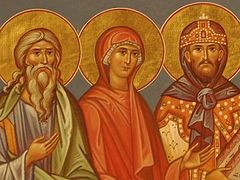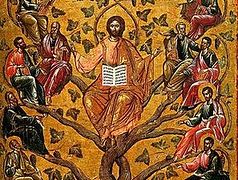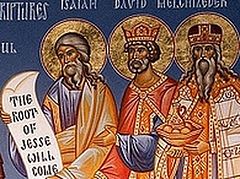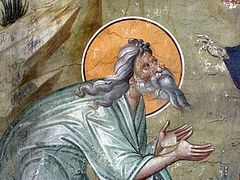 https://pravoslavie.ru/109598.html All biblical names speak, and were most often given to people from a certain prophetic inspiration.
https://pravoslavie.ru/109598.html All biblical names speak, and were most often given to people from a certain prophetic inspiration.
No translation is capable of fully revealing the beauty of the whole spectrum of biblical names and images. For the same things uttered in Hebrew, and translated into another tongue, have not the same force in them: and not only these things, but the law itself, and the prophets, and the rest of the books, have no small difference, when they are spoken in their own language (Sir. 0:4).
Attentively reading into the Biblical names, we discover new horizons in the knowledge and unfolding of the Bible’s mysteries that do not lie on the surface of the letters and words of biblical revelation. It is the spirit that quickeneth; the flesh profiteth nothing: the words that I speak unto you, they are spirit, and they are life (Jn. 6:63).
For example, we can take two different names that in the Russian-Slavonic tradition are unfortunately transliterated identically.
Methusalah, who lived longer on the earth than any other person (nine hundred sixty-nine years—Gen. 5:27) is transliterated like the name of the “Cainite” Methusael (Gen. 4:18), son of Mehujael, and father of Lamech (Gen. 4:18). In actuality the name of the “Cainite” is pronounced Metushael—“asking for death” (who lived an undetermined short number of years), and the name of the “Sethite” Methusalah, son of righteous Enoch is pronounced Matushalakh— “sending away”, “casting out death”.
“Many of the names are descriptive, for example: Laban (“White”), Dibri (“Eloquent”, or “Loquacious”), Edom (“Red”), Doeg (“Careful”), Heber (Gever, “Man”, “Husband”), Ham (“Hot”), Garan (“Highlander”), Harif (“Sharp”), Hiresh (“Rotten”), Ivri (“Jew”), Matri (“Rainy”), Careah (“Bald), Naarah (“Girl”, “Maiden”). Not rarely, people were named after animals: Caleb (“Dog”), Nahash (“Snake”), Shafan (“Rabbit”), Huldah (“Rat”), Arad (“Wild donkey”), Sepphora (Zipporah, “Bird”), Deborah (Dvora, “Bee”), Hamor (“an Ass”), etc.[1]
And there are a multitude of such examples…
Thus, the genealogy of Jesus Christ according to the Gospel of Matthew:
Abraham begat Isaac; and Isaac begat Jacob; and Jacob begat Judas and his brethren; and Judas begat Phares and Zara of Thamar; and Phares begat Esrom; and Esrom begat Aram; and Aram begat Aminadab; and Aminadab begat Naasson; and Naasson begat Salmon; and Salmon begat Booz of Rachab; and Booz begat Obed of Ruth; and Obed begat Jesse; and Jesse begat David the king; and David the king begat Solomon of her that had been the wife of Urias; and Solomon begat Roboam; and Roboam begat Abia; and Abia begat Asa; and Asa begat Josaphat; and Josaphat begat Joram; and Joram begat Ozias; and Ozias begat Joatham; and Joatham begat Achaz; and Achaz begat Ezekias; And Ezekias begat Manasses; and Manasses begat Amon; and Amon begat Josias… (Matt. 1:2–10).
Usually, when the genealogy of the Bible is read, the reader rushes through these texts, without even a clue as to the spiritual mysteries hidden in these very genealogies.
And Josias begat Jechonias and his brethren, about the time they were carried away to Babylon: and after they were brought to Babylon, Jechonias begat Salathiel; and Salathiel begat Zorobabel; and Zorobabel begat Abiud; and Abiud begat Eliakim; and Eliakim begat Azor; and Azor begat Sadoc; and Sadoc begat Achim; and Achim begat Eliud; and Eliud begat Eleazar; and Eleazar begat Matthan; and Matthan begat Jacob; and Jacob begat Joseph the husband of Mary, of whom was born Jesus, who is called Christ (Matt. 1:11–16).
Three main questions arise on the genealogy itself of our Lord God and Savior Jesus Christ:
- Why, besides the name of the Most Holy Virgin Mary, are only the names given in the genealogy of those women who allowed sexual impurity (or were close to such a fall)?
- Why is the genealogy divided into three parts?
- Why is it said: “from the carrying away into Babylon unto Christ are fourteen generations”; but when we count them, there are only thirteen names?
About the first question—on the presence in the genealogy of the Lord Jesus Christ of certain sinful women—we have to remember that, as we know, the Lord Jesus Christ came to call not the righteous, but sinners to repentance (Matt. 9:13), which directly follows (in this case) from His own genealogy.
Thamar (Famar, “palm”)—the sin of incest with a father-in-law (Gen. 38:16);
Rahab (“broad”)—a harlot from Jericho (see Hab. 2:1);
Ruth (“friend”)—an attempt to enter into premarital relations (Ruth 3:9).
Bathsheba (Birshaba), wife of Uriah (“daughter of a curse”)—adultery while her husband was still alive (see 2 Kings 112:3-4).
Each of these women were the direct foremothers of our Lord Jesus Christ!
Blessed Jerome wrote: “It is necessary to note that in the Savior’s genealogy there is not a single holy woman indicated, but only those are remembered whom Holy Scripture censures, in order to show that He Who came for the sake of sinners (that is, Christ.—Auth.), coming from sinners, has made straight the sins of all.”[2]
St. John Chrysostom exclaims and calls to the Evangelist Matthew (about the incest of Thamar): “What are you doing, O God-inspired man, by recalling to us the history of this lawless incest? What of it? he replies (that is, Matthew.—Auth.). If we were to name the generations of some ordinary man, it would be decent to remain silent about such a matter. But of the genealogy of the incarnate God we not only should not be silent, but to the contrary we should even more loudly proclaim this, in order to show His providence and might. He did not come in order to run away from our shame, but to destroy it. Just as we are not so much amazed that Christ died, but that He was also crucified (although it is shameful, but the more shameful it is the more it shows His love for man), so also can we say of His birth: We should be amazed at Christ not only because He took on flesh and became man, but also because He vouchsafed corrupt people to be His relatives, not in the least ashamed of our vices. Thus, from the very beginning of His birth He showed that he does not disdain anything that is of us, teaching us also by this not to be ashamed of our ancestors’ wicked manners, but to seek only one thing—virtues.”[3]
And all this has enormous significance for us! For if Christ comes from this genealogy according to His True Humanity, and according to His True Divinity (unmingled) enters into it, not alienating Himself from its turbidity, this means that He (Christ) is powerful to enter into our life, regardless of its turbidity. For Jesus Christ the same yesterday, and to day, and for ever (Heb. 13:9). Also, in due time Christ died for the ungodly. For scarcely for a righteous man will one die (Rom. 5:6, 7).
And further:
So all the generations from Abraham to David are fourteen generations; and from David until the carrying away into Babylon are fourteen generations; and from the carrying away into Babylon unto Christ are fourteen generations (Matt. 1:17).
As for the second question Chrysostom explains, “The Evangelist divided the whole genealogy into three parts, wishing to show us that with the change of rule the Jews did not become better; but during the time of aristocracy, and under the kings, as well as during the time of oligarchy the same vices were handed down: under the rule of judges, priests, and kings they showed no success in the virtues.”[4]
We must not think that what is said of the Jews does not relate to us, for the apostle Paul wrote about them and us (Christians), that All these things happened unto them (that is, the Jews.—Auth.) for examples: and they are written for our (that is, Christians.—Auth.) admonition, upon whom the ends of the world are come (1 Cor. 10:11). And in our time many ascribe too much significance to various forms of political structure in society. Nevertheless we see, and it is obvious, that with the change in rulers people do not become any better. The Jews also sinned under the patriarchs (the time from Abraham to David)—community clans, or the nationalistic period of rule. They sinned also under the kings (from David to Babylon)—the monarchical period of rule. They also sinned under the rule of various religious oligarchical parties—the period of political pluralism. And all the same, it was necessary that Lord Jesus Christ come into this world, because no political parties and nationalistic speculation can safeguard man from the power of sin, the fear of death and the devil.
In Scripture it is said: Cease ye from man, whose breath is in his nostrils: for wherein is he to be accounted of? (Is. 2:22); and: Put not your trust in princes, in the sons of men, in whom there is no salvation. His spirit shall go forth and he shall return unto his earth: in that day all his thoughts shall perish (Ps. 145:3–4).
All forms of human rule are corrupt to one degree or another... When the Jews wanted to replace the theocratic monarchy with an ordinary monarchy, then the Lord God said to the prophet Samuel: Hear the voice of the people, in whatever they shall say to thee; for they have not rejected thee, but they have rejected me from reigning over them (1 Kings 8:7). And the entire period of kings was a period of spiritual decline. It is said: For a passover such as this had not been kept from the days of the judges who judged Israel, even all the days of the kings of Israel, and of the kings of Judah (4 Kings 23:22). That is, all these kings were so preoccupied with themselves that throughout their days, the Passover was not celebrated. Isn’t that a decline? Isn’t that a spiritual crisis? And what is there to be said of other forms of rule...
Although Russia has come out of its godless “Egyptian captivity”, what has it met along its way to Orthodox Canaan? A cult of the golden calf in the unspiritual desert of nihilism. And they want to make all of us dance and be merry around this new golden “god” (idol). Now the national idea for many people in Russia is getting rich, and engaging in unrestrained competition with each other.
Orthodox Christians should distance themselves from the collective sins of their own contemporaries and never be in solidarity with them. Ye adulterers and adulteresses, know ye not that the friendship of the world is enmity with God? whosoever therefore will be a friend of the world is the enemy of God (Jas. 4:4); and: Be not conformed to this world: but be ye transformed by the renewing of your mind, that ye may prove what is that good, and acceptable, and perfect, will of God (Rom. 12:2).
St. John Chrysostom teaches: “Should you point to wealth, glory, physical beauty, pleasure, and all else that people consider great—this is only an image and not a real thing, a manifestation of a persona, and not some kind of constant essence. But be not conformed to this, says the (apostle), but be transformed by the renewing of your mind. He did not say, be transformed outwardly, but be transformed in essence, showing by this that the world has only an external image, while to virtue belongs not the external but the true, essential image... Thus, if you cast off the externals you will immediately attain (the true) image.”[5]
As for the third question: Why does the Evangelist Matthew write, from the carrying away into Babylon unto Christ are fourteen generations; but we count and find only thirteen generations, St. John Chrysostom explains: “It seems to me that he (Matthew.—Auth.) counts into the generations of the period of captivity also Jesus Christ Himself, everywhere uniting Him with us.”[6] Blessed Jerome similarly explained it: “Recount from Jechonias to Joseph and you will find thirteen generations. Thus, the fourteenth birth is the birth of Jesus Christ.”[7] In other words, Christ entered into this world according to His Divinity, but left it according to His Humanity. He united with us and became wholly related to us, and thus became one of us (a part of His own Genealogy). The apostle Paul also wrote that, Who, being in the form of God... made himself of no reputation, and took upon him the form of a servant, and was made in the likeness of men: and being found in fashion as a man, he humbled himself, and became obedient unto death, even the death of the cross (Phillip. 2:6–8).
Thus, from the whole genealogy of Christ it becomes clear that the Son of God did not disdain our corruption and defilement (recall the defiled women). If the Lord did not disdain them, it means that He will not disdain you and me. On the other hand, those circumstances, in which at the beginning of the Gospel of Matthew are given the names of sinful women, is testimony that this entire Gospel was written for those who consider themselves sinners and defiled. Christ is become of no effect unto you, whosoever of you are justified by the law (that is, by good deed and worthy efforts.—Auth.); ye are fallen from grace, for we through the Spirit wait for the hope of righteousness by faith. (Gal. 5:4–5).
Thus, the Gospels are written, and the Son of God came to this world to save sinners, “for us and for our salvation”[8] !
Now let us look at the spiritual meaning in the translation of all the names of Christ’s Genealogy in order of fourteen generations. As we know, the biblical names were given under the influence of a prophetic spirit, and as rule, were characteristic of a whole generation. For the prophecy came not in old time by the will of man: but holy men of God spake as they were moved by the Holy Ghost (2 Pet. 1:21).
Abraham—“father of many”;
Isaac—“laughter”;
Jacob (Israel)—“deceiver” (“warrior of God”);
Judah—“praising”;
Phares—“gap”, “opening”;
Esrom—“blossoming”;
Aram—“high”;
Aminadab—“generous”;
Naasson—“charmer”;
Salmon—“dark”
Booz—“clever”
Ovid—“worshipping”
Jesse—“wealth”
David—“brother of the father”, “beloved”
The common spiritual characteristic of the period from Abraham to David we have as follows: (Abraham)—blessing through one is given to many; (Isaac)—this blessing is turned to joy, although it was perplexity for the descendants; (Jacob)—the placing of hope on descendants turned out to be deceptive, but with time (Israel)—the situation took a turn for the better; (Juda)—praising of God continued; (Phares)—but the gap from sins committed had already appeared; (Esrom)—the blossoming of spirituality continued; (Aram)—the heights of spirituality beckoned; (Aminadab)—and generous mercy poured out; (Naasson)—spirituality could not stop the charming and sorcery—dual faith, magism and monotheism existed side-by-side; (Salmon)—from this coexistence and indifference darkness was allowed into this world; (Booz)—but reason suggested another direction; (Ovid)—worship of God was preserved; (Jesse)—and it brought the wealth of spiritual life; (David)—as a fruit of the wealth of spiritual life, love grew.
The next fourteen generations:
David—“brother of the father”, beloved”
Solomon—“flourishing”, “prosperity”, “peace”
Roboam—“increasing nation”;
Abia—“(my) father is Yahweh”;
Asa—“doctor”
Josaphat—“Yahweh judges”;
Joram—“Yahweh exalts”
Osiah—“my strength is Yahweh”;
Joatham—“Yahweh is perfect”;
Achaz—“he caught”;
Hezekiah—“Yahweh strengthens”
Manasses—“allowing to forget”;
Amon—“master”;
Josiah—“Yahweh supports”;
The spiritual characteristics of the generations from David to Babylon were as follows: (David)—brotherly love flourished; (Solomon)—from this peace and prosperity reigned in the world; (Roboam)—the nation grew and strengthen spiritually as well as physically; (Abia)—the awareness of sonship to God continued; (Asa)—and this doctored, treated the heart of the nation; (Josaphat)—they needed to not forget about God’s judgment; (Joram)—they needed to remember that true greatness (exaltation) is only from God; (Osiah)—true strength can only be in God; (Joatham)—perfection should have been sought only in God, not hoping in one’s own strength; (Ahaz)—my enemy caught the soul of each; (Hezekiah)—only God could strengthen; (Manasses)—He (God) forgot the sins of the repentant; (Amon)—in a miraculous way the Creator showed His care; (Josiah)—in this way, God supported the life of whole generations.
The last fourteen names:
Jechonias—“confirmed by Yahweh”;
Salathiel—“I asked of God”;
Zorobabel—“born in Babylon”;
Abiud—“(my) father is He”;
Eliakim—“God confirmed”;
Azor—“helper”;
Sadoc—“He (God) showed Himself righteous”;
Achim—“brother”;
Eliud—“God is praised”;
Eleazar—“God helps”;
Matthan—“gift”;
Jacob—“deceiver”;
Joseph—“he adds”;
Jesus—“Yahweh saves”.
The spiritual characteristics of the generation from Babylon to Christ were as follows: (Jechonias)—hope in steadfastness and confirmation could only be in God; (Salathiel)—therefore it was necessary to increase prayer; (Zorababel)—for the spirit of Babylon continued to live in the people; (Abiud)—but they needed to remember the Spirit of God; (Eliakim)—for only He (the Lord) could confirm in truth; (Azor)—mankind needed help; (Sadoc)—He (the Lord) confirmed in righteousness; (Achim)—the believer became the brother to another believer; (Eliud)—it was necessary to praise God; (Eleazar)—help from God drew nigh; (Matthan)—the promised gift from God of salvation drew nigh; (Jacob)—belief in the truth could change the fate and name of each; (Joseph)—God Himself could add to or fulfill all; (Jesus)—salvation from God has come.
Such a mosaic of the meaning of various names has led us to the very Coming of Christ and His Nativity, revealing the spiritual significance of the expectation and experiences of the human race at the threshold of its Savior’s appearance. Names as symbols is a usual thing in biblical exegesis; for example, we can cite the following words of the apostle Paul: Which things are an allegory: for these are the two covenants; the one from the mount Sinai, which gendereth to bondage, which is Agar. For this Agar is mount Sinai in Arabia, and answereth to Jerusalem which now is, and is in bondage with her children (Gal. 4:24–25).
As it is written in Scripture: Who also hath made us able ministers of the new testament; not of the letter, but of the spirit: for the letter killeth, but the spirit giveth life (2 Cor. 3:6); and, But the natural man receiveth not the things of the Spirit of God: for they are foolishness unto him: neither can he know them, because they are spiritually discerned (1 Cor 2:14).
All sources are cited from Russian translations of the same.





